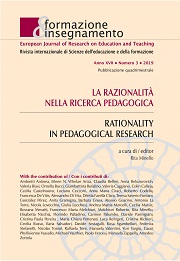Valutare e valorizzare gli studenti gifted a scuola: verso la progettazione di un modello integrato di valutazione per l’inclusione
DOI:
https://doi.org/10.7346/-fei-XVII-03-19_08Abstract
Il talento come lo descrive Francois Gagnè1 rappresenta un processo dinamico attraverso cui le abilità naturali si trasformano in vere e proprie attitudini che richiedono un apprendimento e una formazione sistematici. Il Test d’intelligenza potenziale (TIP) è uno strumento dinamico di valutazione che misura l’intelligenza attraverso indicatori di assessment dinamico che distinguono fra il livello apparente di sviluppo e il livello di sviluppo potenziale della persona. Alla base dell’assessment dinamico del TIP troviamo la teoria socio-culturale di Vygotskij relativamente al concetto di zona di sviluppo prossimale che rappresenta la distanza fra il livello di performance che uno studente può raggiungere senza aiuto e il livello a cui invece egli può arrivare quando è guidato da una persona più esperta in quello specifico settore. Il TIP rappresenta, inoltre, un importante strumento didattico-inclusivo perché consente lo screening di tutta la classe ancora prima che lo studente manifesti forme tipiche di svantaggio socio-culturale e può essere supportato dalla progettazione di un modello integrato che prevede la somministrazione anche di altri test di valutazione come: le Gifted Rating Scale-School Form, il Bender Visual Motor Gestalt Test, il Development Test of Visual-Motor Integration, il Questionario sui processi di apprendimento, il test TEMA, il Test of Memory and Learning, la Scala di sviluppo motorio e la Batteria per la valutazione motoria del bambino.
##submission.downloads##
Pubblicato
Come citare
Fascicolo
Sezione
Licenza
Copyright (c) 2019 Pensa MultiMedia

TQuesto lavoro è fornito con la licenza Creative Commons Attribuzione 4.0 Internazionale.
Formazione & insegnamento è distribuita con la seguente licenza: Attribution 4.0 International (CC BY 4.0).
Per ulteriori dettagli, si rimanda alle Politiche di archiviazione e ai Termini di Copyright e Licenza.





